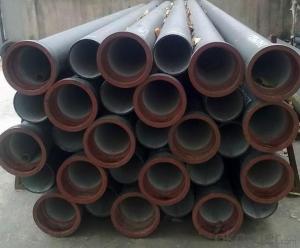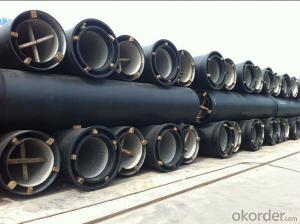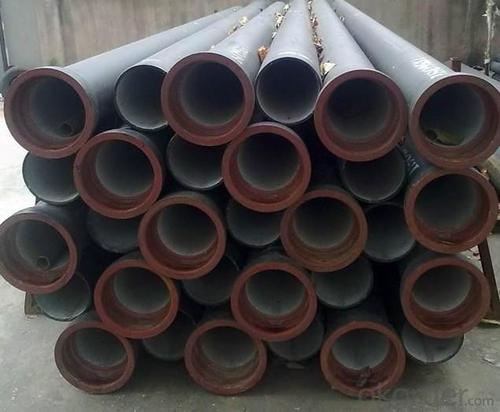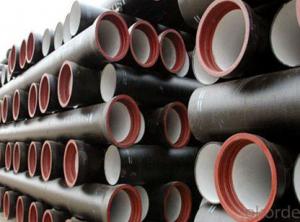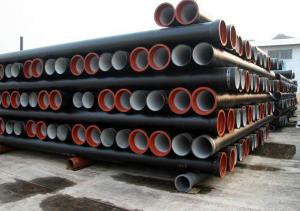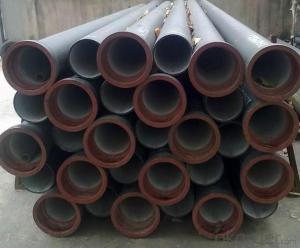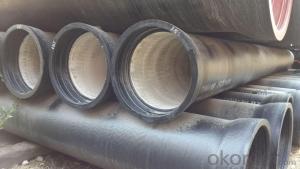Ductile Iron Pipe of China DN200-DN800 EN598
- Loading Port:
- China main port
- Payment Terms:
- TT or LC
- Min Order Qty:
- 25 m.t.
- Supply Capability:
- 300000 m.t./month
OKorder Service Pledge
OKorder Financial Service
You Might Also Like
1,Ductile Iron Pipe Description :
1) Pipes confirm to ISO2531,K9 class,T type joint,6m long,with inside cements lining conform to ISO4179, outside Zinc spraying(130g/m2) and bitumen coating(70μm) conform to ISO8179.
2) Pipe ends: Spigot and socket ends, with 100% SBR rubber gaskets accoding to ISO4633
3) we can do third party inspection according to customer's request.
2,Main Features of the Ductile Iron Pipe:
·High yield strength
·High tensile Strength
·High corrosion resistance
·Pressure Resistence
·Satisfy the highest hygienic standards
3,Ductile Iron Pipe Images:
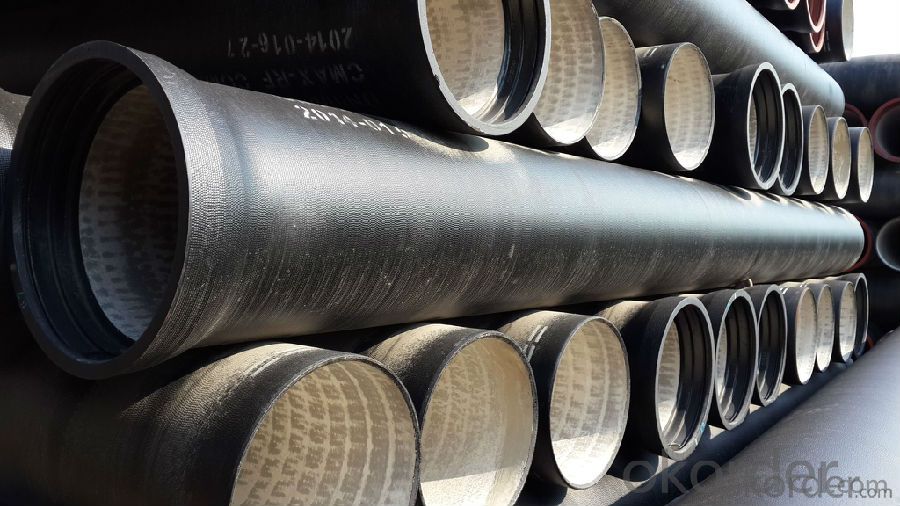
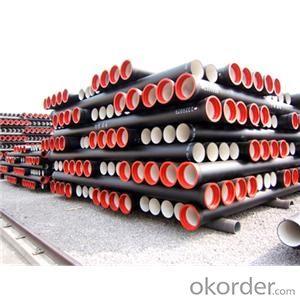
4. Ductile Iron Pipe Specification
Standard: API SPEC 5L 44th eidtion,ASTM A252-98(2007)
Grade: A53 Grades A/B, ASTM A106 Grades B/C,ASTM A179
AWWA, C200, ASTM A139, ASTM A120, API 5L Grade B
Weld Alternatives: LSAW
OD size range: 6.4~44.5mm
Wall thickness: 406.4~1422mm
Length: 3 - 12 m according to requirment
5.FAQ:
We have organized several common questions for our clients,may help you sincerely:
1.Q: Why would you choose ductile iron pipe rather than other pipe materials?
A:The reasons are obvious for that not only ductile iron pipe possesses the inherent strength and flexibility of ductile iron, combined with proven corrosion protection systems, but also the cost savings can be achieved from design to installation and commissioning.
2.Q:Why can you guarantee the inner of pipes can’t be corroded?
A: High alumina cement mortar lining and sulphate-resistant cement mortar lining. These two special linings are applicable to inner anti-corrosion for sewage pipes, improving resistance to erosion of the sewage components.
- Q: How are ductile iron pipes installed?
- Typically, the installation of ductile iron pipes follows a specific process. Firstly, the required depth and width of the trench are excavated. Careful leveling and compaction of the trench's bottom then establish a stable foundation. Next, a bedding material, usually a mixture of sand and gravel, is placed at the trench's bottom. This material supports the pipe and distributes the load evenly, while also safeguarding it from any sharp objects in the soil. Once the bedding is prepared, the ductile iron pipes are gently lowered into the trench and aligned as desired. Proper alignment and the correct slope are essential for efficient water flow. Subsequently, the pipes are joined together using either a mechanical joint or a push-on joint system. These joints are designed to create a secure, leak-free connection between the pipes. Rubber gaskets are typically used to seal the joints and establish a watertight seal. After joining the pipes, the trench is backfilled with the excavated soil. Care is taken to compact the soil in layers to prevent settlement. The backfilling process is typically carried out in stages to ensure proper compaction. Lastly, the installation is completed by connecting the ductile iron pipes to the existing water supply system or other pipes using appropriate fittings and valves. Pressure testing may also be conducted to verify the installation's integrity. In conclusion, the installation of ductile iron pipes necessitates meticulous planning, precise alignment, and secure jointing to establish a durable and dependable water supply system.
- Q: Are ductile iron pipes suitable for fire protection systems?
- Yes, ductile iron pipes are suitable for fire protection systems. Ductile iron is a strong and durable material that can withstand high pressure and temperature fluctuations, making it ideal for fire protection systems that require reliable and long-lasting pipes. Additionally, ductile iron has excellent corrosion resistance, which helps to prevent the degradation of the pipes over time, ensuring the integrity of the fire protection system. The high tensile strength of ductile iron also provides added safety benefits as it can withstand the stress and strain that may occur during a fire event. Therefore, ductile iron pipes are a suitable and commonly used material for fire protection systems in various applications, including commercial buildings, industrial facilities, and residential areas.
- Q: Can ductile iron pipe be used for gas distribution systems?
- Yes, ductile iron pipe can be used for gas distribution systems. Ductile iron is a strong and durable material that is resistant to corrosion, making it suitable for underground applications. It has been widely used in gas distribution systems for many years due to its ability to withstand high pressure and provide a reliable and long-lasting solution. Additionally, ductile iron pipes are known for their flexibility, which allows for easier installation and maintenance. However, it is important to ensure that the specific requirements and standards of gas distribution systems are met when using ductile iron pipes to ensure the safety and efficiency of the system.
- Q: Can ductile iron pipes be used for geothermal energy systems?
- Yes, ductile iron pipes can be used for geothermal energy systems. Ductile iron is a strong and durable material that can withstand the high temperatures and pressures often associated with geothermal energy systems. Its resistance to corrosion and high tensile strength make it an ideal choice for transporting geothermal fluids. Additionally, ductile iron pipes can be easily joined, allowing for flexibility and adaptability in design and installation. Overall, ductile iron pipes are a reliable and cost-effective option for geothermal energy systems.
- Q: Are ductile iron pipes suitable for wastewater treatment plants?
- Yes, ductile iron pipes are suitable for wastewater treatment plants. Ductile iron pipes are known for their durability, strength, and resistance to corrosion, making them ideal for handling the harsh and corrosive environment found in wastewater treatment plants. Additionally, they have a smooth internal surface, reducing the risk of clogging and facilitating the efficient flow of wastewater.
- Q: Can ductile iron pipes be used for cooling water systems?
- Yes, ductile iron pipes can be used for cooling water systems. Ductile iron pipes have excellent corrosion resistance and high-pressure capacity, making them suitable for conveying cooling water. Additionally, their strength and durability ensure long-term performance and stability in cooling water applications.
- Q: Disadvantages of ductile iron pipes
- Compared with cast iron, ductile iron has an absolute advantage in strength. The tensile strength of ductile iron is 60K, while the tensile strength of cast iron is only 31k. The yield strength of ductile iron is 40K, while the cast iron does not show yield strength, and eventually breaks. The strength to cost ratio of ductile iron is far superior to that of cast iron.
- Q: Are there any specific standards or regulations for ductile iron pipe?
- Ductile iron pipe is subject to specific standards and regulations. It is widely used in water and wastewater systems due to its strength and durability. The American Water Works Association (AWWA) C151 standard is the most well-known standard for ductile iron pipe. This standard outlines the minimum requirements for ductile iron pipe, including materials, dimensions, tolerances, and testing methods. It also provides guidance on the manufacturing, installation, and maintenance of ductile iron pipe systems. Apart from the AWWA C151 standard, there are other standards and regulations that govern the use of ductile iron pipe in different countries. In Europe, for instance, ductile iron pipe is regulated by the EN 545 and EN 598 standards. These standards specify the requirements for ductile iron pipes and fittings used in water supply and wastewater systems. Additionally, government agencies like the Environmental Protection Agency (EPA) in the United States may have specific regulations and guidelines for using ductile iron pipe in certain applications, such as drinking water systems. Manufacturers, contractors, and engineers involved in the design, installation, and maintenance of ductile iron pipe systems must ensure compliance with these standards and regulations. This is crucial to guarantee that ductile iron pipe is manufactured to the highest quality standards and that it is installed and maintained correctly, ensuring its durability and reliability in water and wastewater systems.
- Q: How are ductile iron pipes different from cast iron pipes?
- Ductile iron pipes are different from cast iron pipes in terms of their composition and properties. Ductile iron pipes are made from a type of cast iron that has been treated with magnesium to improve its strength and flexibility. This makes ductile iron pipes more durable, impact-resistant, and less prone to cracking or breaking compared to traditional cast iron pipes. Additionally, ductile iron pipes have a higher tensile strength, allowing them to withstand higher internal and external pressures. In summary, ductile iron pipes are a more modern and advanced version of cast iron pipes, offering improved performance and longevity.
- Q: Can ductile iron pipes be used for wastewater treatment plants?
- Indeed, ductile iron pipes have proven to be a viable option for wastewater treatment plants. Renowned for their robustness and endurance, these pipes are well-suited to endure the challenging and corrosive conditions present in such facilities. They possess the ability to withstand elevated pressures and exhibit resistance against corrosion, which is crucial for effectively managing wastewater and the diverse range of chemicals utilized in the treatment procedure. Additionally, ductile iron pipes offer the advantage of being effortless to install and maintain, ensuring an extended period of service. Consequently, they are frequently utilized in wastewater treatment plants for the transportation and distribution of wastewater across the entirety of the establishment.
Send your message to us
Ductile Iron Pipe of China DN200-DN800 EN598
- Loading Port:
- China main port
- Payment Terms:
- TT or LC
- Min Order Qty:
- 25 m.t.
- Supply Capability:
- 300000 m.t./month
OKorder Service Pledge
OKorder Financial Service
Similar products
Hot products
Hot Searches
Related keywords
